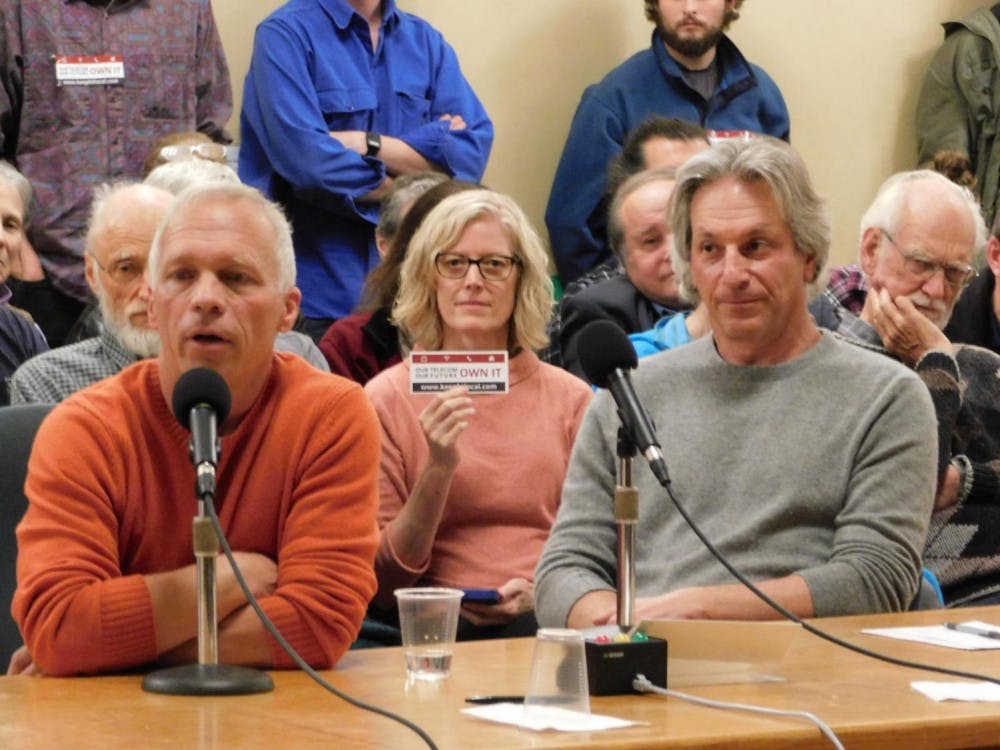After months of debate, a second round of voting for the acquisition of Burlington Telecom ended in a tie on Monday, Nov. 6. Burlington’s City Council was evenly split between supporters of Keep Burlington Telecom Local (KBTL), with a $12 million bid, and the Toronto-based firm Ting, which offered $30.5 million.
Burlington Telecom has been hotly disputed ever since ex-mayor Bob Kiss’s administration covertly transferred $17 million from taxpayers to the company to keep the utility afloat in 2007. In addition to that infusion, the city borrowed $33 million on Burlington Telecom’s behalf over the past eight years from CitiBank. The current mayor, Miro Weinberger, inherited the tangled financial mess but managed to avoid legal repercussions from Citibank in January.
The agreement between CitiBank and the city involved, among other things, a $10.5 million upfront payout to the bank, with a stipulation that Burlington Telecom must be sold within three to five years by the city. CitiBank was promised half of the city’s profits from the sale. The City Council now has the task of choosing between bidders selected by the Burlington Telecom Advisory Board, a group of civic leaders. The remaining bidders are Keep Burlington Telecom Local, the co-operative engineered by citizens determined to keep the company in local hands, and Ting, a publically-shared, multimillion-dollar firm determined to reinvent Burlington Telecom.
“The piece that’s too bad about what’s going on now is it’s simply become political,” said David Provost, chairman of Burlington Telecom’s Advisory Board and Executive Vice President for Finance and Administration at Middlebury College.
The voting procedures have received heightened attention since last Thursday, when Councilor Karen Paul D-Ward 6, citing a conflict of interest in the vote, decided to quit her day job as a staff accountant at McSoley McCoy & Co. The announcement highlighted the importance of the vote for the city. Paul has not responded to requests for comment on her decision.
With the second tie vote in the City Council, city officials proposed that Ting and KBTL take on Burlington Telecom as a joint venture. It is unclear how such a partnership would work. The two have been given until Friday, Nov. 10 to resolve what a joint venture would look like.
In the meantime, there is stiff time pressure on the City Council to resolve the impasse over Burlington Telecom’s control. Further complicating matters is the role of yet another company that helped the city with the payout to Citibank. To secure that financing, Burlington reached out to Blue Water Holdings (“Blue Water”), the company that has also taken on the finances of the bridge project in downtown Middlebury.
According to Provost, the city can control who purchases the telecommunications company only up until Dec. 31. After that, the decision is transferred to the leadership of Blue Water.
Both the Burlington Telecom Advisory Board and Mayor Weinberg have voiced their strong support for Ting as the preferred bidder.
“We sent forward KBTL with the key understanding that its bid didn’t meet the financial standards,” Provost said. “If we sent them to the council, that would give the co-op a longer chance. Burlington Telecom employees are concerned that KBTL doesn’t have the capital and the resources to grow the company.”
KBTL’s primary lender is Maine Fiber. Although the supporters of the co-op think the city should own as much of Burlington Telecom as possible, according to Provost, over the next five years $25 million will go back to the firm. “The irony of them saying ‘keeping it local’ is that all of the money is going to Maine,” says Provost.
Supporters of KBTL have cited that Ting has weaknesses in its offer. Council President Jane Knodell (P-Central District) doesn’t think that Ting’s proposal will be able to adequately provide the returns to Burlington that the people deserve.
“What we’re giving up is local ownership and local control. Because that’s very valuable to me, I think we need to be compensated,” Knodell said. “We should get more of our returns.”
According to Knodell, the co-op would directly provide returns to taxpayers in the form of dividend checks or, if the co-op were able to provide it, through lower prices. The caveat is that Burlington residents who don’t use BT as their provider won’t recoup the same benefits.
Another concern of Knodell’s is the discrepancy in value of Ting’s earnings in Burlington as compared to those in the stock market. As a publicly shared firm, the majority of gains will thus end up with the shareholders, rather than Burlington residents.
“The company is poised to have very strong growth in subscribers and growth in profits,” Knodell said. “They will benefit from that. Burlington taxpayers will not, because they will no longer be the owners.”
Ting has tried to appeal to residents in the Burlington area by embracing Vermont’s rural vibe and promising investment in local businesses. The firm’s parent company is called “Tucows,” with two cows as its logo. “You’d think it’s a Vermont-based company,” says Provost.
Scheduled meetings this week between KBTL and Ting will determine if the two parties can agree on a strategy for a joint purchase by Friday. If they are unable to do so, there is speculation that one of the other bidders that had fallen off the City Council’s short list may be brought back to the table. This includes an Indiana-based company, Schurz Communications.
“I think Ting would have to fundamentally rethink its approach for this joint effort to work. To be a partner with the coop and allow the coop to be the real operator and equal owner,” Knodell said. “It seems like a pretty longshot. But I won’t rule it out.”




